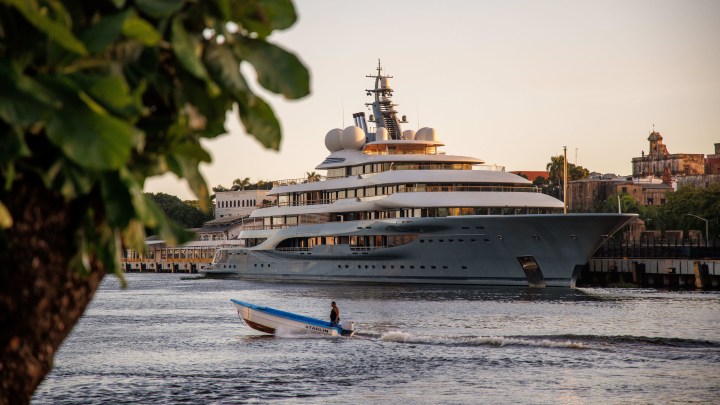
Floating liabilities: Western authorities grapple with the cost of seizing oligarchs’ superyachts
Floating liabilities: Western authorities grapple with the cost of seizing oligarchs’ superyachts

The war in Ukraine — and the sanctions targeting wealthy individuals linked to the Kremlin — has spawned a new breed of enthusiasts at ports and harbors around the Mediterranean. They’re engaged in the latest sport: oligarch superyacht spotting.
“Barcelona has a shipyard that can handle repairs of these mega yachts, and so a number of these Russian oligarch yachts have been here,” said Alex Finley from her home in the Spanish port city.
“Solaris, owned by Roman Abramovich and reportedly worth $600 million, was here for a number of weeks. She left the port just before he was sanctioned and headed for Turkey.”
Finley, a novelist and former CIA officer, is well-equipped to comment on the ownership and movements of these vessels. For her latest novel, she carried out intensive research into the outrageously expensive and lavishly appointed craft.
“They sometimes have more than one helipad,” she said, “and full-size swimming pools, dance floors that turn into swimming pools, Jacuzzis. The opulence inside them is incredible.”

And the paranoia of their owners just adds to the cost.
“Some of them have anti-missile defense systems on them. They have state-of-the-art radar systems,” Finley said. “So these are yachts that require an enormous amount of maintenance and an enormous amount of money constantly going into them.”
That’s a problem for the authorities that have so far detained about a dozen of these vessels under the sanctions. “There was, at the beginning, a little bit of glee that the authorities were seizing some of these yachts, but now the reality sets in,” she said.
The reality is that since the oligarchs cannot pick up the bill for upkeep because their bank accounts have been frozen, it’s the arresting authorities that have to bear the rapidly escalating cost of mooring and maintaining these thoroughbred leviathans.
“These things have enormous running costs,” confirmed Sam Tucker, head of superyachts with market intelligence group VesselsValue. “As a general rule of thumb, about 10% of the yachts’ value should be spent on them every year.”

That’s 10% of some astronomical numbers. Alisher Usmanov’s superyacht, Dilbar — which was seized in Hamburg — has a market price of around $750 million, so the cost of mooring and upkeep will be ruinous. But without that essential maintenance, Tucker observed, a superyacht will depreciate fast.
“Yachts which have been laid up or neglected, when they are sold, they’re sold at significantly lower prices than what they could have achieved had they been maintained properly,” he said. “You could perhaps see 50% of the value taken off of these yachts.”
Some of the vessels have been detained while they are still in a shipyard under construction, and that represents another financial burden on the authorities, said Tom Keatinge, director of the Centre for Financial Crime and Security Studies in London.
“These vessels are sitting in dry docks, blocking up valuable construction space in places like the Netherlands, where you’ve got these unfinished hulks lying around with nobody to take ownership of them,” Keatinge said. “As it stands, the onus and the liability lies with the government that has arrested the vessel.”

The arresting governments can’t sell the yachts whether they are under construction or fully seaworthy unless they can be linked to a specific crime.
Under current U.S. law and most laws in Europe, the vessels still technically belong to the oligarchs. Neglecting the craft and allowing them to rot could also be very costly.
“One can assume the lawyers for the oligarchs will argue that, ‘Look, we weren’t able to maintain this vessel. It’s lost tens of millions of value whilst you’ve arrested it, so we’re going to sue you for that loss,'” Keatinge said.
Moves are underway in the U.S. to allow the authorities to more easily sell the seized yachts, to defray the upkeep costs and raise money for Ukraine. Nothing similar has surfaced in Europe yet, where most of the vessels have been detained.
Plus, author Finley isn’t sure how much of a market there’d be for such confiscated property.
“I’m not sure I would want to be sailing around the Mediterranean on the yacht of a pissed-off oligarch!” she laughed.
Dozens of oligarch yachts are thought to have eluded the authorities and be either on the move or moored beyond the reach of the sanctions. The authorities may be quietly relieved about that. One of the vessels that got away — Abramovich’s most expensive, the Eclipse — is said to be worth more than a billion dollars, implying an annual upkeep cost of $100 million.
There’s a lot happening in the world. Through it all, Marketplace is here for you.
You rely on Marketplace to break down the world’s events and tell you how it affects you in a fact-based, approachable way. We rely on your financial support to keep making that possible.
Your donation today powers the independent journalism that you rely on. For just $5/month, you can help sustain Marketplace so we can keep reporting on the things that matter to you.

















